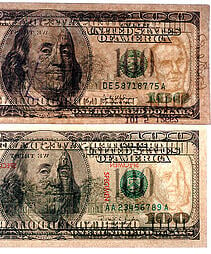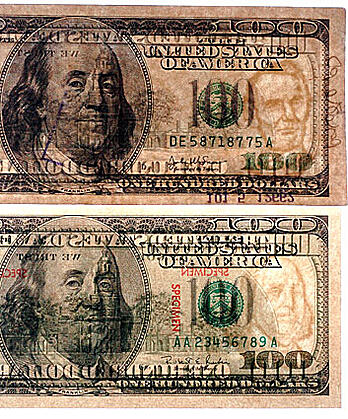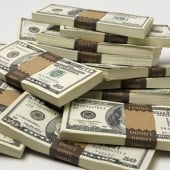Desktop publishing to make money: A simple business concept used either to supplement income or generate enough of it to actually make a living. Desktop publishers are producing books, marketing equipment, educational materials. And they're counterfeiting money. Yes, counterfeiting money. They are literally using desktop publishing to make money.

The key to successful desktop publishing is, of course, the equipment used. Technological advances have produced computers, scanners and printers of the highest quality and sophistication, at prices that most people can afford. Gone are the days when only a business had the capital to purchase the best computer, highest DPI scanner and high quality laser-jet printers.
But is counterfeiting money an issue that should even concern us? Aren't businesses, not individuals, the ones that suffer? And doesn't counterfeiting require more than just a good visual reproduction (e.g., special paper)?
In order, the answers to those questions are yes, no and yes and we'll look at each one. First, counterfeiting money is definitely an issue that should concern us. The United States Secret Service reports that it removed $261 Million in counterfeit money from circulation in the U.S. economy in 2011. That's the amount removed, not the amount suspected to be in circulation. Counterfeit bills pose a threat to our economy and our national security, weakening the very foundation of our monetary system.
To fully comprehend the magnitude of counterfeiting money, however, we need to understand that it's not just businesses that suffer. Remember that counterfeiting results in business losses, with retailers, bars/restaurants, even banks, giving up something of value for what is ultimately money not worth the paper it's printed on. Those losses need to be recouped somehow. Losses not reimbursed by insurance are recovered by charging higher prices and offering fewer services to the consumer.
But we still haven't addressed any direct effect on individuals. Consider the case of David Lipin. In 2010, Mr. Lipin, a resident L.A., cashed a $1,000 Postal Service money order at a West Hollywood post office, receiving ten $20 bills and eight $100.00 bills. He needed to buy gas and when he gave the clerk one of his new $100.00 bills, he was advised it was a fake. Long story short, after dealing with the L.A. police department, L.A. County Sheriff's office and the U.S. Postal Service, he was advised by the Secret Service that he was out of luck. That's correct. If you come into possession of counterfeit bills, even from a government entity, there is no financial recourse. You're stuck with those bills.

Mr. Lipin's cautionary tale brings us to how such bills are often produced. In his case, both the $20.00 and $100.00 bills were actually $5.00 bills that had been bleached and altered. And this is where desktop publishing comes in. A high quality image can be reproduced by today's best scanners. That image can then be modified, altered and/or enhanced by any number of available photography software programs and then printed using a high-end laser jet printer. While these fake bills are detectable to those who handle money frequently, they are usually of sufficient quality to deceive the average person (or the waitress in a dimly-lit bar or restaurant).
Of course, no technology can reproduce passable currency onto regular paper. However, if someone has the patience to alter real money or has access to paper made from cotton and linen fibers (rag paper) rather than wood (cellulose-based), the problem of fake bills not feeling like real money is solved.
Technological advances in computers, scanners and printers makes counterfeiting money easier while making detection more difficult and essential than ever before.



Leave a Comment